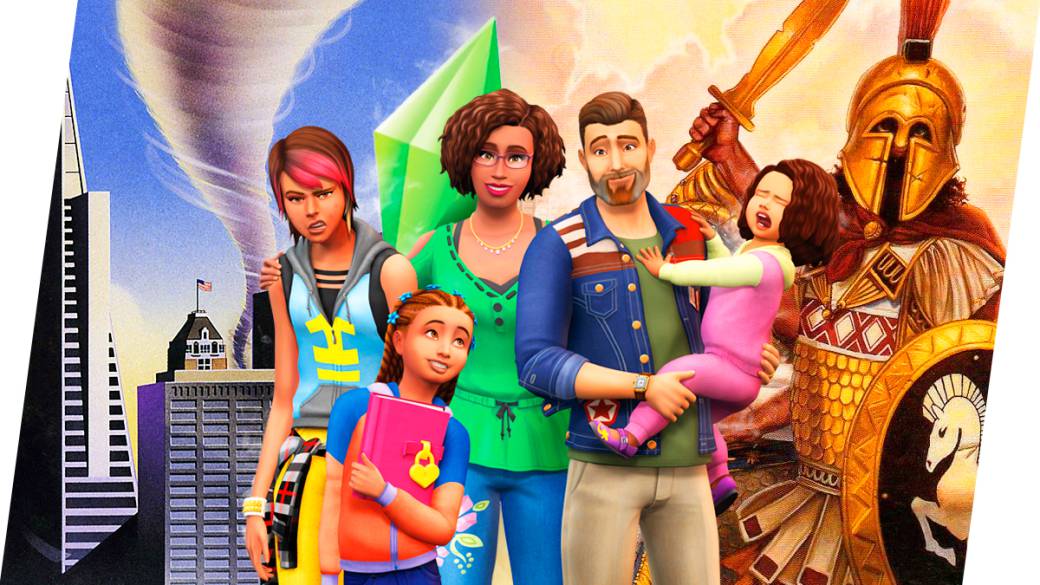
When replicating real life it can be just as or more fun. The history of simulators.
Flight, driving, social or strategy simulators. They are some of the examples that are currently grouped within the genre. But how did the simulation start? If we go back to its beginnings, the concept of simulation has in fact evolved a lot. After the Second World War, it was when the term gave way to a meaning closer to the one we currently know how to “imitate the behavior of some situation or process.” This concept was applied to video games in the 1960s.
What started out as a concept focused on aviation learning, is now a popular genre that has succumbed to a more playful and mass facet. Many games have formed the solid pillars of the simulation, and although it is impossible to mention them all, today we will review the history of this particular genre that has not stopped growing.
Precursors of the genre in arcade rooms (1970-1990)
We are in the 70s. We are in the golden age of motor racing and the precursor of the genre of what we know today as simulation. Its beginnings come back years ago, when the first simulators were used for military purposes to facilitate learning in the field of aviation until later jumping to the general public. The genre, in fact, did not take much longer to arrive in its most playful form. During the 1970s, 1980s, and early 1990s, many titles were available in arcades, even though so many others were also posted on home platforms. It was in 1973 when “Space Race” landed in the arcades of the time, giving rise to one of the first -ludic- simulators in history under the license of Atari. The title, entirely in black and white, promised to offer a spatial simulation experience where we had to dodge the objects thrown at us by the screen in cooperative mode. After the success of the title we did not take long to see other games based on the simulation of space or asphalt races such as Astro Race, Speed Race or Laguna Racer.
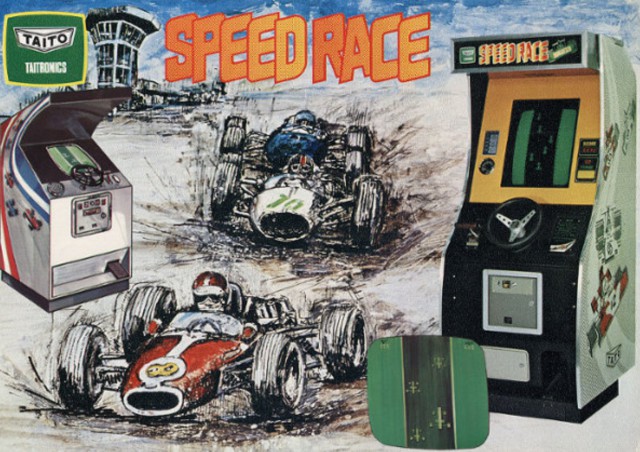
With the simulation, it was possible to provide a greater physical sensation of speed, acceleration and perception of the environment – something that the motor sector knew how to take advantage of quickly – to offer a real experience of something that is not happening. It was undoubtedly a more colorful, realistic and “risky” experience without exposing its players to the real dangers of the road. The first driving-based playful simulators managed to capture a new audience that begged for more demanding experiences each new season shortly after the success of Space Race in 1973.
Don Daglow: the father of simulation
Utopia, 1981
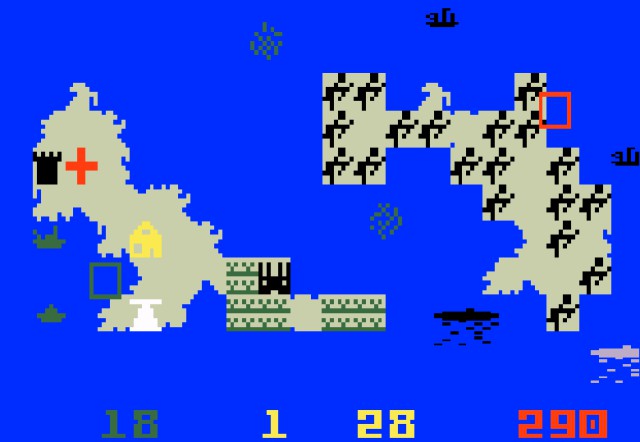
In the mid-80s, we can say that the first beginnings of the simulation came with the title “Utopia” directed by Don Daglow. A simulation concept that multiplied the possibilities of the game, providing a more original perspective until then. Employed by Mattel in 1980, Daglow was part of Intellivision’s team of programmers, creating Utopia in 1981: the first title based on simulation from a more complex perspective than previously done. Its title takes as reference an island invented by Sir Thomas More’s eponymous book “Utopia” published in 1516. On this imaginary island, a society lives in harmony with its government and all inhabitants are freed from poverty, tyranny and from the war.
Don Daglow was inspired by this story to create one of Intellivision’s greatest hits. The fact of dealing with the management of a population and a territory was most innovative, since it surprised by offering a rare gameplay at the time. A precursor title to the genre, which was released before Sim City, and which managed to lay the foundations for the concept of modern simulation, from which many other current titles such as “Tropic” have been inspired.
“At that time, Intellivision offered numerous sports and action titles. Directors wanted other types of games to balance the console catalog, so I created Utopia for that purpose. ” Don Gaglow.
A year after Utopia, in 1982 Microsoft’s Flight Simulator title came in stomping. The slogan of the game said: “If flying on your IBM PC were more realistic, you would need a license.” The team was intended to attract real pilots and those who thought they were aviators from the easy chair. Say that with the game we could simulate A flight may sound exaggerated, although in that sense, the 1982 announcement was true: Flight Simulator was realistic enough – and still is – to make it as real as a small airplane cabin in inexperienced hands would be. The launch of Flight Simulator was, without a doubt, one of the events that most influenced the market for current simulators, since many of them were based on its successful formula: offering an immersive experience combined with a large dose of entertainment.
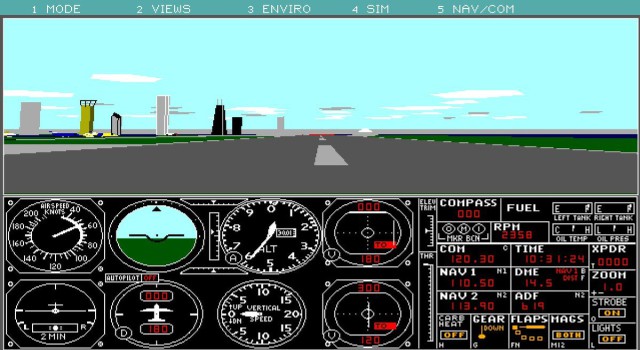
Two years after the successful Flight Simulator, another key simulator in its history was Fortune Builder, launched in 1984. Fortune Builder promised a gameplay involved in developing a rural area with various options to manage businesses, factories, stadiums, casinos and camps. The title included multiple difficulty settings that determined factors such as starting capital and the goal set to win. An original bet that gave rise to one of the forerunners of the “fénomeno” Sim City.
The first social simulator
Little computer People, 1985
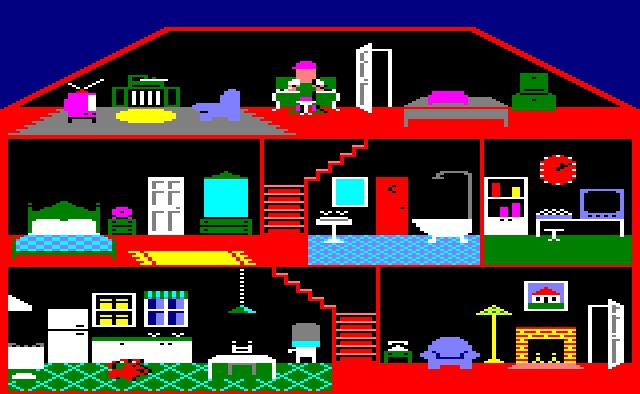
There are curious games within the simulation, and then there is Little Computer People. Designed by David Crane in 1985, Little Computer People – also called House on a Disk – is one of the first social simulators released by Activision for Commodore 64, Sinclair ZX Spectrum, Amstrad CPC, Apple II and Atari ST. As if it were the Sims, in the game we had to monitor the food and water supply of our characters, in addition to being able to decide on a series of fairly limited actions. In the simple title, we observed our character living in his new house and, ultimately, we had to ensure his well-being. A completely original and risky bet in its beginnings, which was poorly used due to its lack of mechanics.
The boom in sports simulators
BMX Simulator, 1986
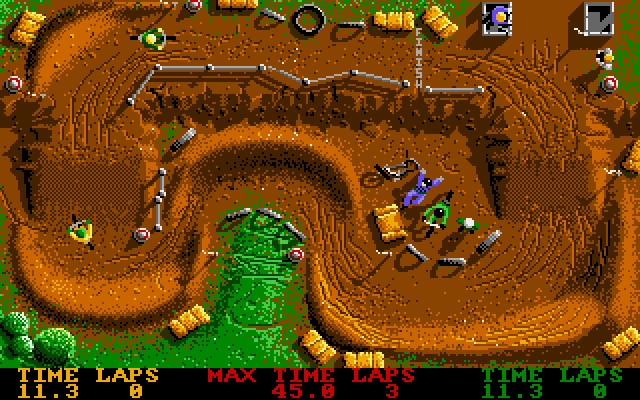
The simulators were used effectively in the sports environment. Sports simulators arose as a need to improve the gaming experience in titles initially based on the field of motor or sport. And it was not for less: in this case BMX Simulator is a racing title released by Codemasters in 1986 for Commodore 64 and adapted to other domestic machines. The experience in the game promised to be a realistic simulation in a BMX championship, and after its success, the studio soon launched successful titles based on sports simulation such as: ATV Simulator in 1987, Pro Boxing Simulator in 1988 or Grand Prix Simulator in 1989.
A before and after in the simulation
Sim City, 1989
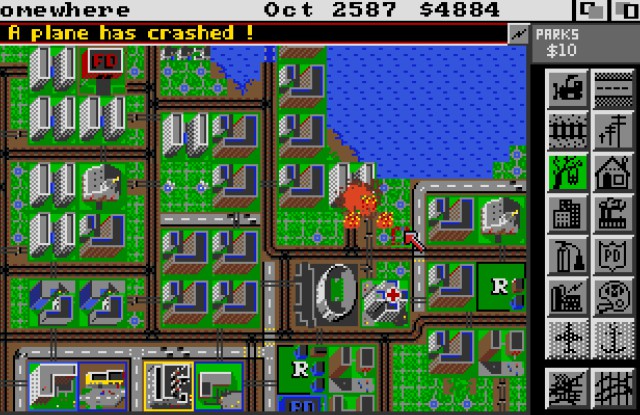
Sim City was one of the titles that undoubtedly most enriched the simulation genre. Will Wright’s idea, in 1989, marked a before and after in previous simulators and promised an original experience: building and managing cities. Wright started creating Sim City in 1985, although in fact, the idea came from his previous game, Raid Over Bungeling Bay in 1984, a title that simulated traffic and customized the urban landscape.
Sim City’s future seemed initially not to be very successful. Two years after his development and after different encounters with Jeff Braun, Wright achieved one of the facts that would catapult him to success. Sim City was marketed through the company they jointly founded: Maxis.
At its launch in 1989, Sim City stood out completely from other contemporary games, especially for its marked realistic appearance. A short time later, he launched SimLife and SimEarth, educational titles intended to teach players the basics of genetics and global ecosystems through simulation. With his contribution to this genre, Will seduced a new public type and laid the foundations for the most modern management and simulation games.
“In a way, Sim City comes from Montessori. If people are given models to build cities, they will deduce from them the principles of urban planning.” Will Wright on Sim City.
Playing God: Strategic simulation under fire
Populous, 1989
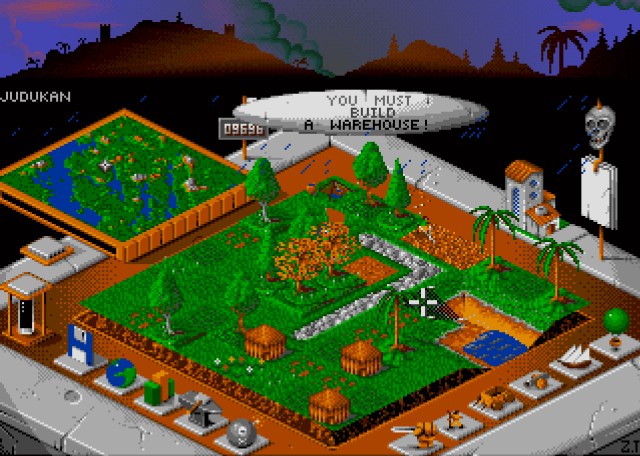
Populous is a strategic simulation title directed by Peter Molyneux and developed by Bullfrog in 1989 by Electronic Arts. It was initially released in 1989 for Amiga, Atari ST, and DOS. The goal at each level was to grow our number of villagers and defeat rivals from the other world with whom we competed. Here is the essence of the game: We didn’t actually control our villagers directly, but the world they are in. In this case we could control the terrain, the weather and the leader of our village to a certain extent.
In addition to Populous, more titles based on more strategic management were inspired by incorporating historical elements, such as Wing Commander in 1990. Wing Commander was a “space opera” that was inspired by the battle of the Pacific during World War II and popular movies that dealt with the conflict. The title developed a cinematic aspect thanks to the animation sequences that were inserted between the phases of space combat. Wing Commander was born with the aim of involving the player a lot in the game and in the universe, marking an important stage in the history of video games for being it was one of the first titles that attracted the attention of PC players at the beginning from the 90s. His cockpit space battles were unknowingly precursors to many other titles in the years to come such as “Starfox” in 1993 until “Race the Sun” in 2014.
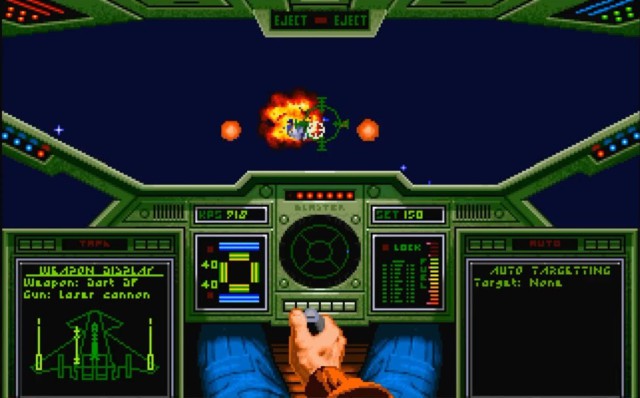
“The way we played affected the story, and my theory was that it naturally led to more immersion.” Chris Roberts, creator of Wing Commander.
Back to the stone age with historical simulators
Civilization, 1991
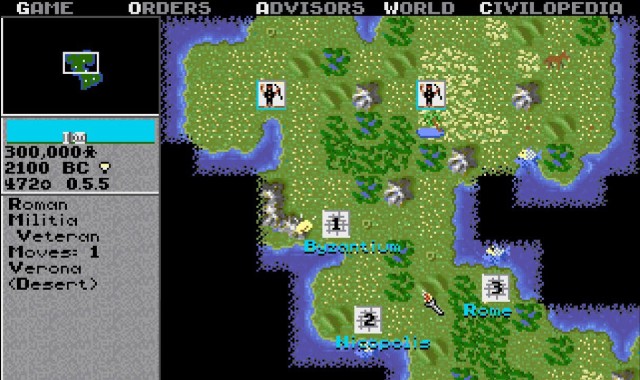
Within the strategic simulation we cannot forget Civilization, one of the biggest influences of many current titles. Launched in 1991 by Sid Meier, the title came for different platforms with a similar purpose to Populous. In this case, the concept of “Civilization” was based on world history, borrowing some elements from Sim City. The title based on the historical simulation required a planning of our resources and populations as it was shown long ago in Populous or Wing Commander.
Later we saw its second installment with the release of Civilization 2 in 1996. A title that marked a before and after within the simulators that were already established, raising the bar in quality and difficulty. With an innovative game system and a high level of details, they made Civilization II a memorable title, which went down in history as one of the best strategic simulators of the moment. They inspired the release of many other well-known titles, such as the beloved Age of Empires, a year later in 1997.
“Sim City was a source of inspiration, as the Civilization prototype was in real time, but I was not satisfied. So I decided on turn-based play. ” Sid Meier, creator of Civilization.
Caesar, 1992
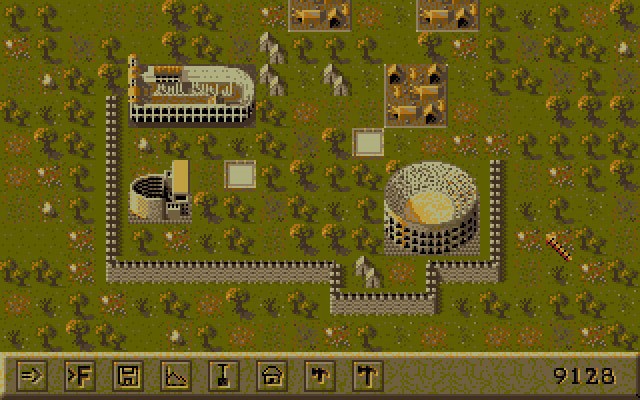
Following in the footsteps of the popular Sim City creator, Caesar built on it, dramatically improving his build options under a historical setting. In the title we had to strategically build and manage the destiny of our empire. In charge of the Emperor, who judged progress and performance in four main areas, including peace (keeping citizens and barbarians away from doors), culture (public places such as hospitals, schools, and temples), prosperity, and empire size. Unlike Sim City, Caesar brought a greater immersion and direct relationship about our actions in it. A historical simulator that located us in the heart of Rome, and that to win we had to take the title of Emperor.
Age of Empires, 1997
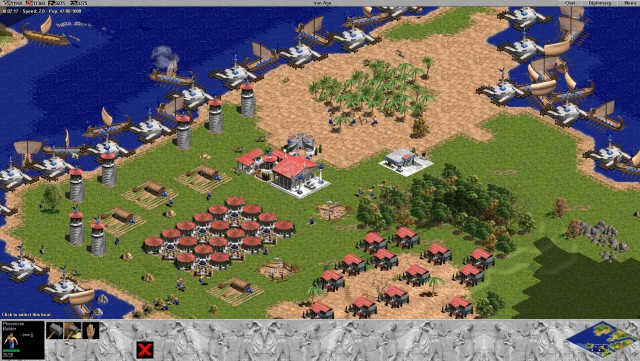
In 1997 we find the launch of Age of Empires. A title that changed everything, especially in its improvement within the category of strategic simulation in real time. We all know his goal, where we are in charge of an empire. The empire we choose will dictate a large part of the first part of the game, such as the resources and population we have. The game innovated focusing more on the historical and warlike development between cultures. Since these required direct responsibility for our decisions in the game, with their respective consequences. After the success of Age of Empires, many titles were based on him, such as: Total War in 2000, Age of Mithology in 2002 or Rise of Nations in 2003.
The popularity of Bullfrog Productions
Theme Park, Theme Hospital (1994-1997)
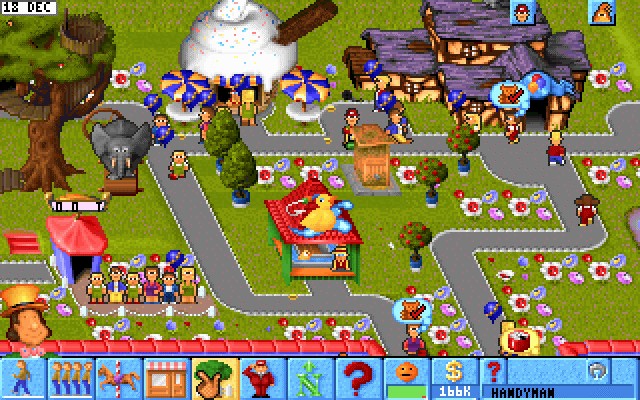
Simulation-based games have taken many forms, if not tell the Bullfrog Productions team. The study that Populous developed had the idea of giving us a title that was and continues to be a best seller. Does Theme Park or Theme Hospital sound familiar to you? Theme Park is a spatial management game, released in 1994. The title revolves around building a theme park and serving park visitors. This includes placing various attractions, shops (food, drinks, and gifts), restrooms, and decorative items. The goal, as always, is to maximize the amount of money your visitors spend during their stay, which is primarily accomplished by keeping them as happy as possible throughout their journey through the complex.
Despite being the first of its kind in many ways, probably the title’s most interesting feature was the ability to create complex rollercoaster designs starting from scratch using different segments. The game, in fact, became the predecessor to the Roller Coaster Tycoon, taking on many of Theme Park’s original mechanics. Soon after, the theme park was followed by a much more popular sequel that we all know: Theme Hospital. Its launch in 1997 was tremendously successful, leading to an avalanche of space management and resource simulators that revolved around similar ideas.
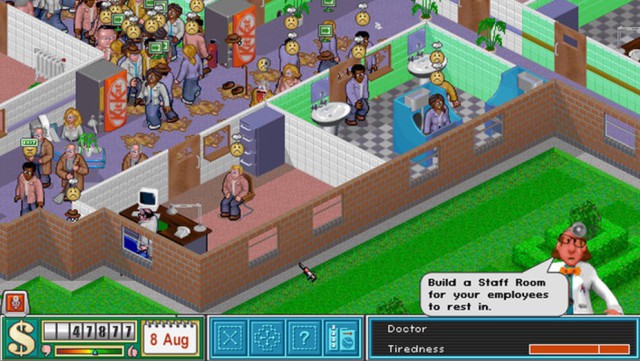
Mass phenomenon: Social simulation
The Sims, 2000
Given by Will Wright -the creator of Sim City- in 2000 the Maxis studio published one of the first most successful modern social simulators in the history of video games. In fact, the name “Sims” is a declaration of intent, as it is due to the meaning of Sim (simulation) and its remaining S to (social). Currently “The Sims” are one of the modern social simulators par excellence almost uninterruptedly since their first version in 2000. In the game we could play with characters like the-adorable-Rookie or the Tombstone, in addition to having the possibility of creating our own character, this being a quite innovative and attractive element for many players of the time. The relationships we established in the game, the detailed construction of our home and the development of skills of our character, made the Sims one of the best social representations captured in a video game. A game, which set itself apart by treating real aspects of life itself with its own personal joys and dramas, including aging and the random death (or not) of our characters. Who has not ever removed the pool ladder so they could not get out of it?
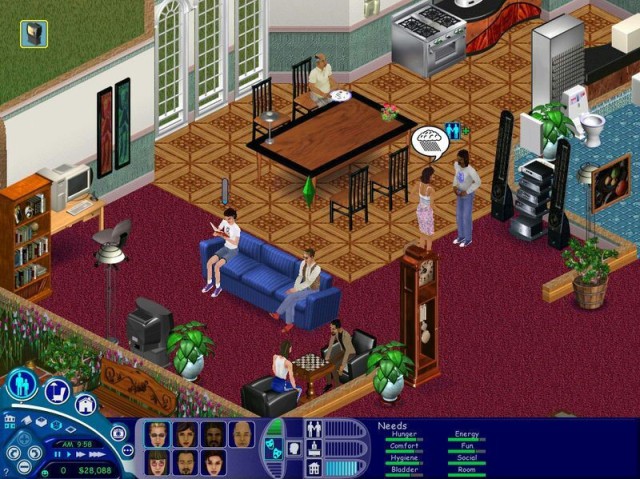
Animal fever
Animal Crossing, 2005
It was in 2005 when Nintendo released Animal Crossing. And we are sure that not even they would imagine the success of sales that it obtained, and that in fact, it has today. A title that broke barriers and that its popularity elevated it as one of the most commercialized social simulators par excellence. With an approach very similar to the Sims, except that in this case, we found friendly animals and an entire community to manage. And we can not deny that the Animal Crossing saga has been a before and after within social simulators, maintaining the same formula in each of its deliveries, while improving some characteristics that make it a community every time. more solid.
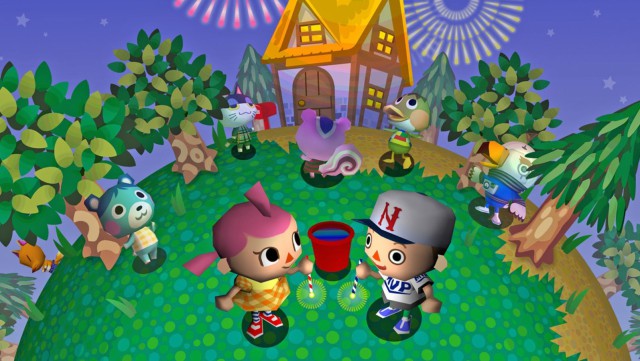
The “Simulator” fashion
Currently we find simulators of all kinds. On the shelves of many digital stores like Steam, it is common to find an appropriate simulator for each of us. And each of us says, because the catalog is vast, each one more crazy. From dating simulators with pigeons like “Hatoful Boyfriend”, rural simulators like the well-known Farming Simulator to the casual Goat Simulator, although this simulator has little. Most of these titles offer a variety of “career” modes and professional development, allowing players to advance their experience, which generally involves getting fully into everyday activity in any role. All of these new simulation-based titles derive in part from their predecessors, games that combined a reward system through an immersive experience through simulation.

The future of simulators
The future of simulators has done nothing but take off. The visual fidelity and control improvements of many of the current titles have increasingly enriched our gaming experience, bordering on the boundaries between reality and simulation. Although currently we have titles that go beyond simulating. We have an example with “IRacing”, a monthly subscription game that promises an exceptional simulation experience aimed at both players and professionals due to its high level of detail. And in fact, there are many more examples.
Today’s simulators are more immersive and effective than ever. A genre that is potentially exploited in which we can also use its own controllers to improve our gaming experience. From steering wheels, replicas of acceleration quadrants, and even live a better experience thanks to virtual reality. And it is that more and more, with the simulation we return to its initial intentions: learning. Thanks to modern simulators we can learn a lot about a profession either in “Farming Simulator” or other career simulators, and even live our own virtual reality experience -without leaving home- through titles like “Subnautica”. If we are clear about anything, it is that with its wide and improved catalog, the genre sets the bar higher and higher and without a doubt, there is little left to stop surprising us.

